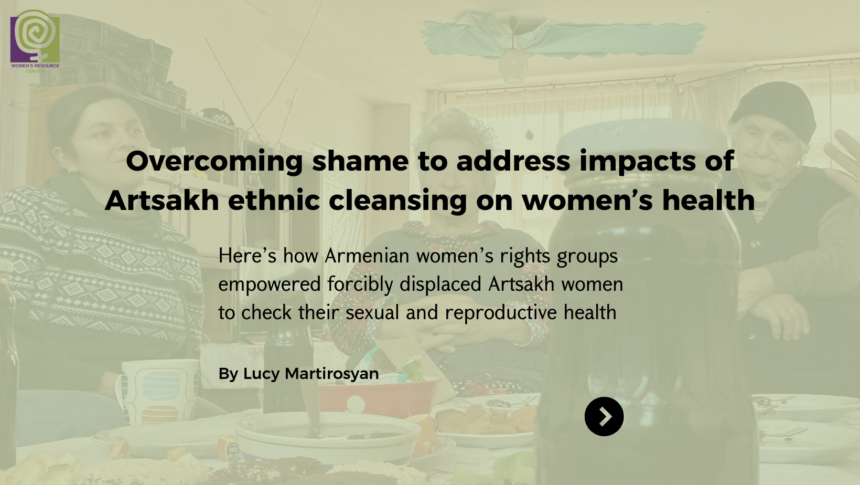Here’s how Armenian women’s rights groups empowered forcibly displaced Artsakh women to check their sexual and reproductive health.
By Lucy Martirosyan
Since the ethnic cleansing of Artsakh, Armenian women’s rights groups have been leading efforts to provide gender-sensitive health support and aid to forcibly displaced families.
But when the Women’s Resource Center (WRC) first announced free and accessible sexual and reproductive health and rights (SRHR) services for Artsakhi women and girls last September, almost no one showed up.
“From the start, we thought that maybe this project couldn’t be successful,” said Anush Poghosyan, the executive director of the Women’s Resource Center (WRC). “No one was thinking of testing for STIs or going to see a gynecologist.”
“Sexuality, especially STIs, is a taboo topic in Armenia,” Poghosyan added. “We don’t have sexual education at schools.”
Out of the more than 100,000 ethnic Armenians forced to flee Artsakh and seek refuge in Armenia, women and girls make up 52% of the population. During the nine-month blockade, new mothers struggled to find baby formula, and almost 90% of pregnant women suffered from anaemia and tripled rates of miscarriages due to increased stress and malnutrition. Meanwhile, the hospitals had been overcrowded and underresourced.
International actors agree that in times of crisis and war, displaced women and girls become most at risk of preventable sexual and reproductive health-related illnesses and death. The World Health Organization (WHO) and the United Nations Populations Fund (UNFP) urge countries to implement the minimum initial standard package (MISP) for sexual and reproductive health and rights (SRHR) during emergencies.
In place of the Armenian government, the WRC launched the MISP for the second time since the 2020 war via crisis funding from the International Planned Parenthood Federation (IPPF). “We don’t have a MISP standard in Armenia, this is something new for our government,” said Poghosyan, who also manages the MISP project by the WRC.
Although the MISP does not require a needs assessment before its implementation, the WRC conducted one anyway. “We needed more time to work with the women and build trust,” Poghosyan said.
So far, nearly nine months later, over 270 displaced women aged 18-60 have benefitted from accessing free STI/HIV testing, contraceptive methods, safe abortion care, and medical examinations and treatment for sexual violence.
Tackling shame
Last October, the WRC teamed up with gynecologist and sexologist Dr Armine Hovhannisyan to hold trauma-informed discussions about sexual and reproductive health with dozens of displaced women temporarily living in five shelters across the Armavir, Ararat and Kotayk regions.
“During these meetings, I understood that these women needed something beyond discussions about testing for sexually transmitted infections,” said Dr Hovhannisyan. “They have complaints related to their menstruation or overall well-being, but they decline to go to the doctor.”
While most families have since been rehoused today through refugee cash payouts and housing initiatives by the Armenian state, the WRC needs assessment found that the foremost concern of many displaced women remains to secure stable housing and employment. Meanwhile, health issues related to chronic illnesses such as diabetes and high blood pressure were a third-tier concern. Gynecological care, however, was at the bottom of the list.
Some of the women expressed feelings of powerlessness after losing their husbands, the main breadwinners of the family, during the gas-depot explosion that killed over 200 people on the night families were cramming into cars to flee their ancestral homeland from Azerbaijani aggression on 25 September 2023.
The events leading up to the ethnic cleansing of Artsakh and its aftermath “were not only devastating for them, but for us, too,” Dr. Hovhannisyan said. “If I feel a similar grief, then we should be able to talk about it and help each other.”
After several sessions, the women started asking questions on their own related to irregular menstrual bleeding, best practices for feminine hygiene, women’s sexuality, and menopause.
“We have this problem in Armenia, where everything should be done for children. Meanwhile, the woman gets lost,” Dr Hovhannisyan said. “She should always be a mother, but where is the woman?”
“Focus on yourself”
Liza Matevosyan, who co-managed the MISP, hopes the main takeaway for participating women is that “If you change the focus from other people onto yourself, and you are happy and healthy, your family will be, too.”
Although the participants of the project remain anonymous for their security, “women who received the services were satisfied,” said Matevosyan, a co-founder of the Women’s Resource Center Shushi, an NGO working to empower women from Artsakh, where it was previously based before the war in 2020.
“It’s important that these opportunities continue as they don’t exist in the region,” Matevosyan added. “Particularly when it comes to supporting women after surviving sexual violence.”
 Legal advice
Legal advice

Leave a Reply